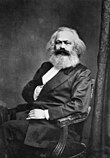
Back احتياطي جيش العمل Arabic Industrielle Reservearmee German Ejército industrial de reserva Spanish Armée de réserve de travailleurs French Esercito industriale di riserva Italian 相対的過剰人口 Japanese 산업예비군 Korean Subsidium industriale Latin Industrieel reserveleger Dutch Exército industrial de reserva Portuguese
| Part of a series on |
| Marxism |
|---|
| Part of a series on |
| Marxian economics |
|---|
 |
Reserve army of labour is a concept in Karl Marx's critique of political economy.[1] It refers to the unemployed and underemployed in capitalist society. It is synonymous with "industrial reserve army" or "relative surplus population", except that the unemployed can be defined as those actually looking for work and that the relative surplus population also includes people unable to work. The use of the word "army" refers to the workers being conscripted and regimented in the workplace in a hierarchy under the command or authority of the owners of capital.
Marx did not invent the term "reserve army of labour". It was already being used by Friedrich Engels in his 1845 book The Condition of the Working Class in England.[2] What Marx did was theorize the reserve army of labour as a necessary part of the capitalist organization of work.
Prior to what Marx regarded as the start of the capitalist era in human history (i.e. before the 16th century), structural unemployment on a mass scale rarely existed, other than that caused by natural disasters and wars.[3] In ancient societies, all people who could work necessarily had to work, otherwise they would starve; and a slave or a serf by definition could not become "unemployed". There was normally very little possibility of "earning a crust" without working at all, and the usual attitude toward beggars and idlers was harsh.[4] Children began to work at a very early age.
- ^ Francis Green, "The Reserve Army Hypothesis: A Survey of Empirical Applications," in Paul Dunne (ed.), Quantitative Marxism, Cambridge: Polity Press, 1991, pp. 123–140.
- ^ Rosdolsky, Roman (1977). The Making of Marx's Capital. London: Pluto Press. chapter 18, p. 250 note 19. ISBN 978-0-904383-37-9.
- ^ Garraty, John A. (1978). Unemployment in History: Economic Thought and Public Policy. New York: Harper and Row. ISBN 978-0-06-011457-2., chapter 2.
- ^ Garraty, p. 14.